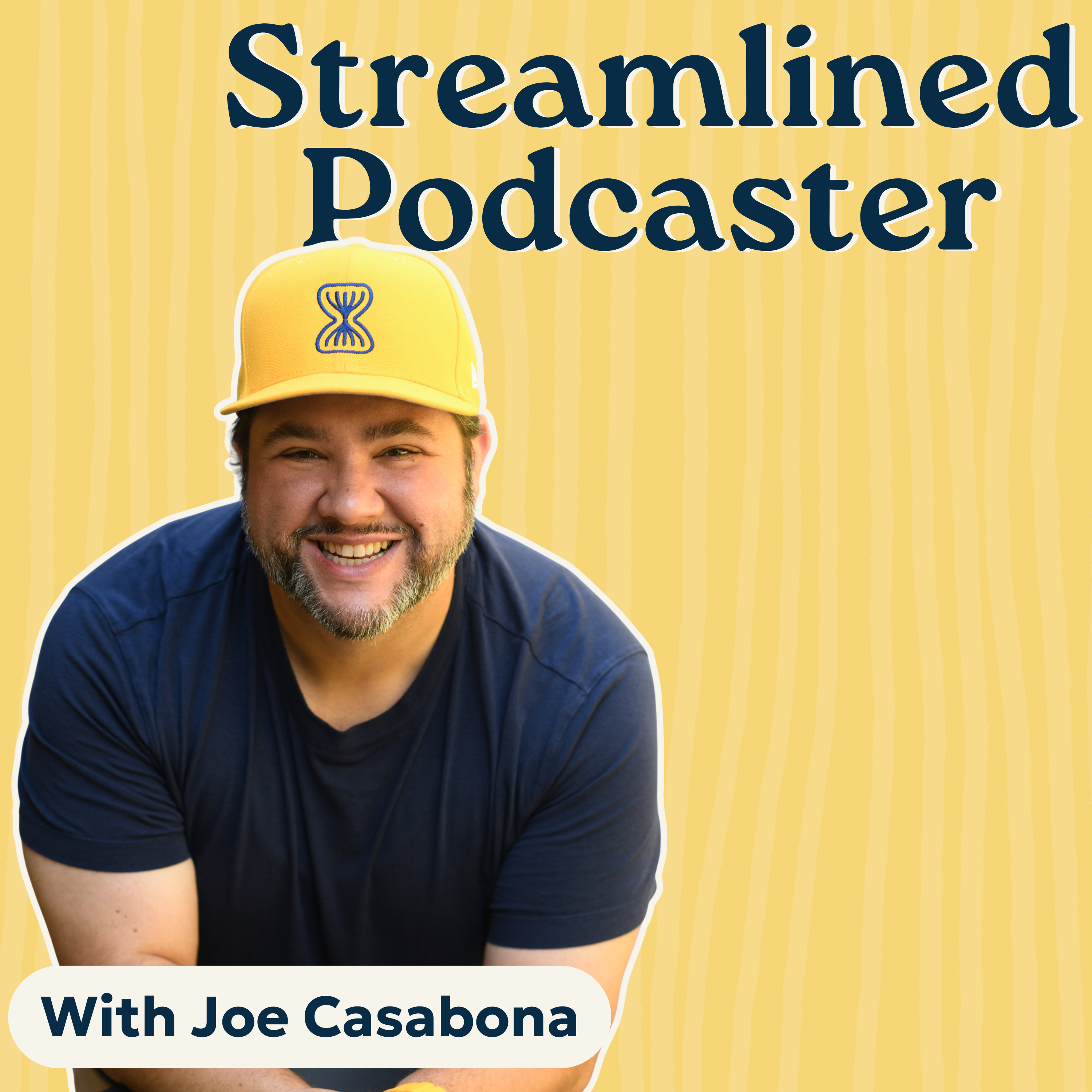Podcasting Made Simple
Podcasting Made Simple is the premier podcast about podcasting! We’re here to help podcast guests and podcast hosts reach more listeners and grow their income so they can change more lives! Join Alex Sanfilippo and other podcasting industry experts as they share how you can level up on either side of the mic! (Show notes and resources: https://PodMatch.com/episodes)
Podcasting Made Simple
A Content Paradigm Shift You Must Embrace | Alex Sanfilippo
As podcast guests and hosts, we're all looking for a way to stay relevant and get ahead with our content. As we attempt to achieve this goal, we've neglected what will ultimately lead to our success. In this episode, Alex Sanfilippo shares why it's time for a paradigm shift in our approach to content. Instead of focusing on quantity, it's time to do less and ensure it's of the highest possible quality. Get ready to learn how to rise above the noise in podcasting and skyrocket your impact and influence!
MORE FROM THIS EPISODE: HTTPS://PODMATCH.COM/EP/263
Takeaways
Shift your focus from quantity to quality in podcasting.
Align with your why and think about who you serve.
Join a community of like-minded, quality-first creators.
Stay consistent and avoid compromising quality.
Consider repurposing content to maximize its impact.
Articulate the pain point your podcast solves in a few words.
Measure the success of your podcast by its shareability.
Engage with your listeners and make adjustments based on their feedback.
Have a lot to share about your podcast in various contexts.
Test the quality of your work and ensure it withstands scrutiny.
Produce higher quality content to achieve better results.
Chapters
00:00 The Quantity Mindset
01:06 Shift from Quantity to Quality
02:03 The Shift in Social Media
03:23 Quality Over Quantity in Content Creation
04:19 The McLaren Analogy
05:15 Podcasting is Like Taking the Stairs
06:14 Finding Your Capacity
07:11 Consistency is Key
09:04 Joining a Quality-Focused Community
09:58 Repurposing Content
11:48 Articulating the Pain Point
13:13 Getting Your Quality Right
14:38 Testing the Quality of Your Work
15:02 Producing Higher Quality Content
MORE FROM THIS EPISODE: HTTPS://PODMATCH.COM/EP/263
🎁 Want 9 quick ways to level up as a podcast host, guest, or agency? Visit https://PodMatch.com/Free! (No signup required)
You're listening to Podcasting Made Simple. I'm your host, Alex Sanfilippo. For this episode's guide and resources, please visit podprose.com slash 263. And now let's get to the episode. More than ever in podcasting, on either side of the mic, as a guest or as a host, we are seeing this desire for more come into play. Here's the thing, we want to release more episodes if we're a host. If we're a guest, we want to be a guest on more podcasts. The mentality is always more, more. We have this quantity mindset. But here's the problem with quantity or more, is it doesn't take the most important success factor of podcasting, or all content creation for that matter, into consideration, which is this one thing, quality. We have this quantity first mentality, but if we can shift our focus to quality over quantity, our results would drastically increase. My name is Alex Sanfilippo, if I've not had the chance to meet you. And I am so excited that you're here today, because I'm going to really dive into how we can shift this mindset away from quantity and focus more on quality and what that will ultimately do for each of us as creators, again, on either side of the mic as podcasters specifically. So first off, I want to kind of jump into this because the first place we've seen this is in the forefront, if you will, of the creator economy, which social media kind of runs the game, right? That's kind of like our standard for almost everything. As bad as I may think that is, that is the reality of it right now. And we've been sold for years. If you want to make it on social media, it's more, more. But here's the thing, we're starting to see a shift away from that. And don't take my word for that because I'm not like the world's greatest marketer or anything like that. However, One of my fellow PodMatch Elite Mastermind members, Katie Brinkley, I think really is a leading expert in marketing and social media. And she is seeing a huge shift in the data away from this quantity mindset and into a quality mindset. What the algorithms are starting to favor more is high quality content. And it hasn't always been that way, right? It's always been like more, more. The more you do, the more you get favored, right? But now it seems to be, the better it is, the more it gets favored. And some people have figured out how to do both, right? I'm not going to get too deep into that today because I think that for many of us that just seems very overwhelming. What's better is to say I can do really well with a little and maybe I'll eventually add more. First is saying I'm gonna do more and hopefully it'll get better over time. We've got to shift this mindset that we have because we are already seeing that happen in social media. So let's get the forefront of this thing and really focus on it. You know, before I get too far ahead of myself, I keep on thinking about this story. I'm a bit of a car guy. I don't necessarily like drive cool cars, but I like to look at them. I don't think I could ever bring myself to anyway. I digress. I just would hate to go park somewhere and someone opened an icon. Imagine you're driving a million dollar car and someone opens their door on it and gets a ding in it. It's like, when you're driving a Honda Civic, you're like, oh, I can probably get that fixed. When it's a million dollar car, you're like, no, right? So not saying it's for me, but I do love cars. And so I'm thinking of McLaren, which I don't know the exact numbers. I don't know if they post them, but they apparently make about 5,000 vehicles per year. Not a whole lot, right? If you think about it, it's like, yeah, only 5,000. But here's the thing, that's considered the... top of the top. That's one of the best vehicles that is made every single year. And those cars, some of them cost millions of dollars. Here's the thing. They might not be making 5,000, but they are the absolute pinnacle. They are the top versus other vehicles where hundreds of thousands and maybe even millions of them are being made every single year, right? Of other models of vehicles that are much lower tier and nothing against those. I not to have a car as I drive, right? However, you get what you pay for, right? And here's the thing with our content, we don't want to be the one that's producing millions of things that are, eh, they're just okay. We want to be in that 5,000 range, that if you will, McLaren mindset being like, oh, this is the best, this is the pinnacle. This is why you should listen to this podcast guest, whether they're on a show or this, this host whenever they're releasing a new episode, right? We want to think of it that way. And to go into kind of keeping this like story idea, if you will, I want to share something from years back in my life. My family at one point bought a Beach condo in Ormond Beach. They sold it. I'm still super bitter about it years later. Sorry, mom and dad. Wish that wouldn't have happened. However, I remember whenever I'd go down there for like a weekend vacation type thing, I don't know why it was like, I think it was like the 14th floor of the building. I liked to take the stairs for some reason. I guess it's because I never like lived in something like that or had that opportunity. So I made a point very early on like to take the stairs instead of the elevators, which they did have. And the rest of the family, including Alicia, would take the elevator and I'd be 10 minutes behind them. sweating, right? At least that's how it was at first. And it's funny because over like months of doing this, and it wasn't every day keep in mind, but on a regular basis I go over there, I started being really quick on the stairs and efficient. I get up to that like that 14th floor and people like my family like, dang you're like barely even breathing hard. That's crazy. And then once I did it with friends and I got up there, I'm not exaggerating, I was waiting like five minutes for me to get to the top and they're like dead when I get up there. And I was like, oh yeah that was me at one point, right? You just kind of got used to it. Again, I'm sad that that's gone. My legs are not as strong as they were because of that. But here's the thing. I want to mention this and relate this to podcasting now. Podcasting is like taking the stairs, not the elevator. Yes, it takes longer, but is it worth it for the strength that you gain as a result? Absolutely. Nobody ever developed stronger legs by taking the elevator, right? You gain that by taking the stairs. It takes longer. Maybe it's not as enjoyable of a ride, right? because you're doing the work, but the truth is it makes you stronger. And for all of us, we have to think about this type of thing when we're a podcast guest or host. And here's the way I want to position it. You might be asking me now like, well, Alex, then how many episodes should I release? Or Alex, how many episodes should I be a guest on? And I want us to think about it this way. Not how many can you do, it's how many can you do without taking even the slightest hit on the quality? When the actual quantity starts affecting the quality, you know you've broken the threshold. So again, we want to figure out how to just say, you know what, my quality takes no, no damage happens to my quality if I don't pass this number. If I pass that, I can't do very well. A great example of this is at one point when I was really heavy in the podcast guesting side of things, I was doing three a day sometimes. And I realized, I'm so sorry if you're from my third guesting slot in a day, my quality that I was able to deliver on that third time around was nowhere near as good as the first or the second one. And also I realized that when I do them really early in the morning, I don't. really communicate as well. My brain hasn't really had time to move. And so I figured those things out and I realized, you know what, I'm really only capable of doing one a day. I'll just go and admit that. And it needs to be within this certain time block, kind of when I'm at my freshest, right? Because I want to bring my best. And the other thing is I didn't want to do more than one a week anymore because I found that I would remember what I just shared and I'd almost be too repetitive versus really showing up in the moment. Now, perhaps you have a bigger capacity of that, and I'm sure that many of you do. And that's fine. So maybe you're like, oh, I can do 10 a day. And if that's the case, by all means, I guess go for it. That seems like way too much, right? And that it's going to bring me straight to my next point. So for me, I found one a week was my sweet spot, a certain time of day, because that's when I show up my best for the host that I was going to be with. Same on the side of me being the host, same thing, right? I'm recording this in my prime time hours. Let's put it that way, not early in the morning or late at night when I'm not at my best. But the other thing I wanted to mention right there is the way to think about this, is you want to do what you can do consistently for a long... term basis. Now what I mean by that is if right now you're like, Alex, I can record 10 episodes a day. If I ask you this question, hey, okay, great, 10 episodes a day. Can you do that for the next five years straight? If you're like, no, no way. Here's the thing. That means you're doing too much. You got to bring it back down to where you say, I can deliver consistently long-term quality first content on this five-year consistent basis without going crazy or anything like that, right? Or starting to focus more on the quantity instead of the quality. That's what we have to be able to do. So, What I want to do is give a couple tangible things here, some practical takeaways, right? I'm first going to share, and I've got these things written down because I want to make sure I get them all here. But the first one is how to shift your focus away from quantity over to quality. Number one is to realign to your why. Realign to your why. If you have ever heard me speak, you have heard me bring up your why at one point or another. And I always do this because it is so important. So please don't be like, ah, here goes Alex again. No, no, stop, stop. Go get pen and paper. Get away from the computer. Pause this if you have to. Realign to why you're doing what you do, because that will always bring you back to the quality versus quantity mindset. None of us got into this to be like, I'm gonna do everything. No, we got into it because we had something specific we wanted to do and someone hopefully wanted to serve with it. And that brings my second point here. The second way to shift from quantity to quality is to think about who you serve. Realign to your why and at the same time, really think about who it is that you serve. Who is it that you're there for? And what quality do you feel that you really owe that person? Get someone specific in your mind, even if it's a fictitious character, like an avatar or an ideal listener, right? And that applies to either side of the mic as the guest or the host. Think about who you're really serving. The next thing I wanna mention is how to shift this mentality is to get around like-minded, quality first creators. Join a podcast community. You know I always speak about community, right? And if you're listening to this, hopefully you're somewhere in the PodMatch ecosystem or checking out Podcasting Made Simple, but regardless, make sure that you're in the community of that. with other like-minded, quality-first creators. Not getting around like the quantity bros, I just made that up, but that sounds cool, right? Don't go for the quality bros and be like, let's make more, no, no. Let's get better and better and better, even if that means doing a little bit less. Get into the community with like-minded people because we are who we hang out with. The next thing I already mentioned, but again, I wanna go back to, it was very important, so I wrote this down a couple times, but make sure that you stay consistent instead of going crazy. Think about that five-year idea again, right? What can you consistently do for five years? There's a lot of times where I ask people like, hey, do you think you can podcast for the next five years straight? And they're like, I don't think so. That seems like too much, right? That means they're doing too much. They have not been able to adapt it into their lifestyle. They've not been able to say, I can do this really well. Sure. It's not a whole lot, but this is what I can do for me at one point, by the way, when I first got into my first quote unquote, real podcast that I did, this was many years ago, but I can commit to one episode a month. one episode a month, but guess what? It was always a really good episode. You can go back and listen to, at that point you can go back and listen to all of them. They were all like really high quality. I never felt like there was anything I let out that wasn't really, really good. But I knew that's all I could do at that point. If I even went bi-weekly or something like that, I knew that my quality would really start to drop. So again, stay consistent about going crazy, think about what you can do for the next five years. The next thing I want you to do is think about it this way. Is there enough content for you to repurpose for a long time? And what I mean by that is can you break your podcast up into like blog posts, into shorts, into different types of things, right? I'm not telling you to go do a bunch of that, but could you? Is there enough meat in there to make it actually worthwhile to do that? I was recently on a podcast and the guy broke the episode. I'm not trying to toot my own horn here, but the guy broke what I said. And I think, I don't know, it was like 20 different clips. And I started listening to them. They're all like super good. And that's not to say, oh, Alex spoke really well. It's more so the questions the host was asking me were really good. And so I started sharing them all over the place. I'm like, man, we talked for like 20 minutes and I've got 20 different things to share in that time. That's what you want to be able to do is say, okay, there's a lot here. How to know if you're, by the way, I had to know if you're not necessarily doing the right way is if you're like, ah, there was only like really one thing I could share in like a little snippet out of that entire episode. It means it's not really high quality. So you want to be able to find those little things. Not necessarily telling you to go make hundreds of clips and shorts and repurpose it to death, right? But do something and try to figure out, is there enough meat in here? I could really break this down if I wanted to. So keep that in mind. Now I want to kind of shift gears here and this is kind of where I'll land this thing. And I'm hoping you're taking notes here because this is the part you really want to focus on. This is how to know if you're getting your quality right. So I want to talk about how to know if you're actually getting the quality right. Here's the first thing. You're getting your quality right if you're able to articulate the exact pain point you solve for people who listen. to your podcast? And I'll add this, in a very few amount of words. So are you able to articulate the exact pain point you're solving for somebody who listens to your podcast in just a few words? I find that many podcasters, unfortunately, we're not really able to do this. When I say, who's your podcast for? What is it doing for somebody? They go on this five minute rant. And here's the thing, like, if it takes you five minutes to explain how you're helping somebody, I don't know, and I'll do respect, I don't know if you really know what it is that you're helping somebody with. So my show called Podcasting Made Simple, right? What is it that I help people do? What's the pain point I'm solving? Taking the complexity out of podcasting, both for podcast guests and hosts. I know what it is that I solve with my content, therefore I'm able to have higher quality content because I am so sure of what I deliver to people. Think about it this way. This is how you can know if you have high quality content. And if you don't feel like you know this, go back to your why, right? And start writing it down and figure out how to get that condensed in as few words as possible. The next thing is, if you want to know getting your quality right, ask yourself this question, is my podcast getting shared by people? I encourage you, if you didn't hear last time I did a solo talk, go over to podprose.com slash 250, podprose.com slash 250, check it out later, but it's me talking about the silver bullet for success in podcasting on either side of the mic, and a little hint here about what, spoiler if you will, it's about your podcast getting shared. So good that people can't help but share it. You're getting your quality right, if everyone on earth is being like, I have to share this, it's the best ever, right? The next thing is, are you hearing from your listeners? If not, is that a red flag? And here's the thing, even if you're like, well, I'm not really right now, well, start reaching out first. Don't just assume you're not doing a good job. Start reaching out, talk to your listeners. They'll tell you what they love and what they don't and make adjustments based off what you hear from the people that are actually listening to your podcast. They have no real connection to it other than the fact that they found it, right? And so I think that that's a really important thing. The other thing is to make sure that you have a lot of things to share and continuously do that, right? to share about your podcast. What I mean by that is not just on social media, but in person, do you have a lot to share about it? When you have gold nuggets coming out of your podcast, you want to be like, hang out with your family and friends, be like, oh, let me tell you what this person said. Just listen to this for just a second, right? Let me explain this real fast here. If you have a lot of that to do, you know you have some pretty high quality content. And the last thing I'll share here is if you're like, really just not sure on this, I encourage you, there is a test specifically for podcast hosts right now, sorry, podcast guests, we're working on that. But if you go to start.podscore.io, start.podscore.io. podscore.io, it'll start giving us ideas on how to implement some of these things around this quality first mentality that will really help you be able to, one, grow your show, but also ensure that you're doing a really great job with it. So in ending, I want to mention that we should view our podcast or podcast guesting as a precious metal. And what I mean by that is we put these things to the fire to remove all the imperfections, right? I want us to start thinking about our podcasting journey that way, that we're going to put it to the fire and see what's there and what's not there. I wrote down this quote that I love and it says, each person's work becomes obvious when revealed by fire. The fire will test the quality of each person's work. Are you willing to test the quality of your work? Will it withstand the fire when you put it in, right? Or how much is gonna be left there? Do you start off with a huge chunk that turns into something so small you can barely see it? That's what we're looking at when it comes to quality versus quantity first. So I encourage you, get out there. start producing higher quality content for the people that you are serving, and I promise you you're going to see even better results than ever before. If you enjoyed this episode, please visit podprose.com slash 263. Then share the link with one person that you believe it would add value to. Until next time, thank you for listening.
Podcasts we love
Check out these other fine podcasts recommended by us, not an algorithm.
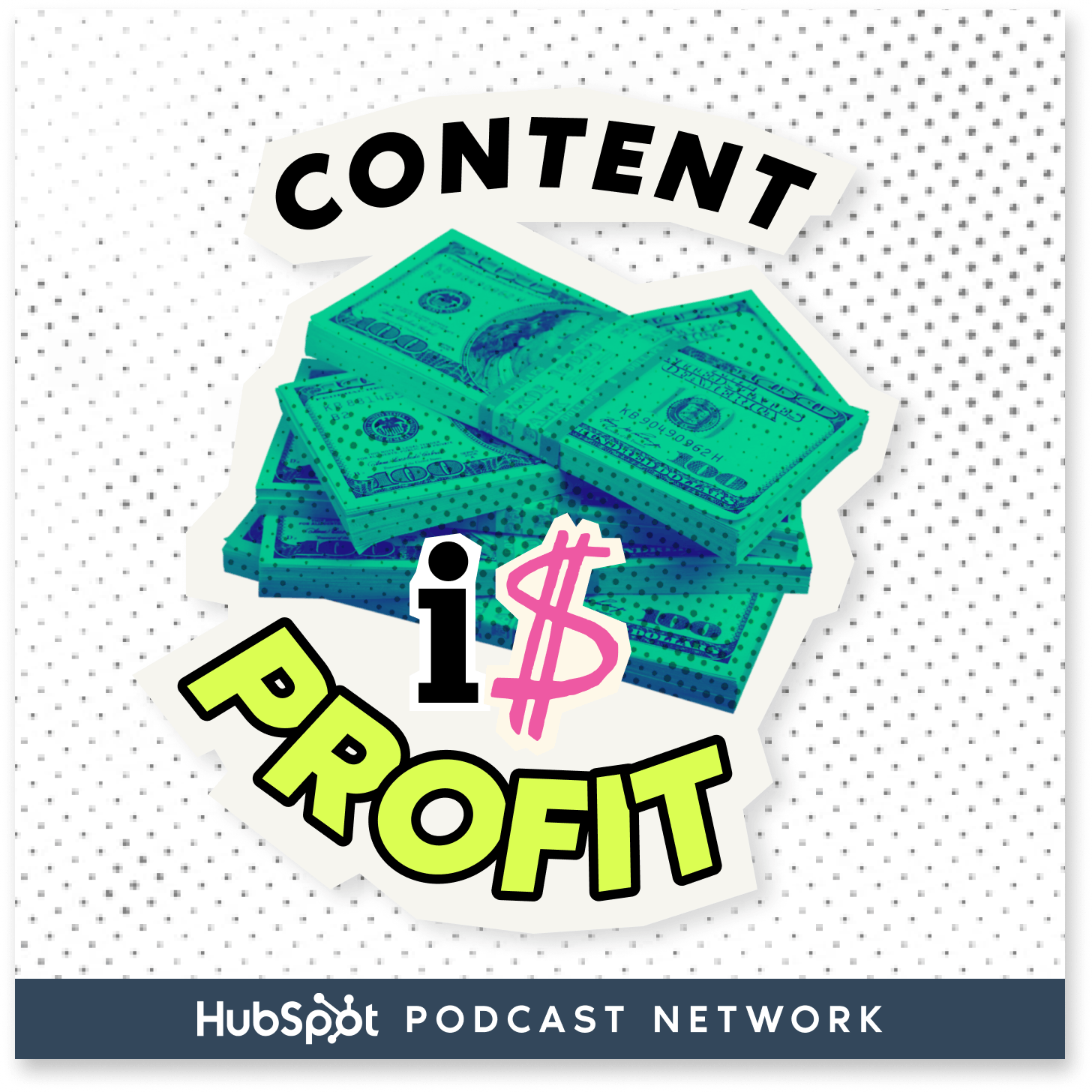
Content Is Profit
BIZBROS
Win The Content Game
Deirdre Tshien - CEO & co-founder of Capsho, AI-powered Content Marketer (the fastest way to repurpose and market your expert content)
Fastlane Founders and Legacy with Jason Barnard: Personal Branding, AI Strategies, and SEO Insights
Jason Barnard Entrepreneur and CEO of Kalicube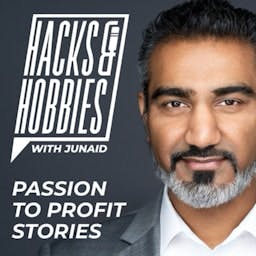
Hacks and Hobbies with Junaid Ahmed
Junaid Ahmed
I Have A Podcast by Vinnie Potestivo
Vinnie Potestivo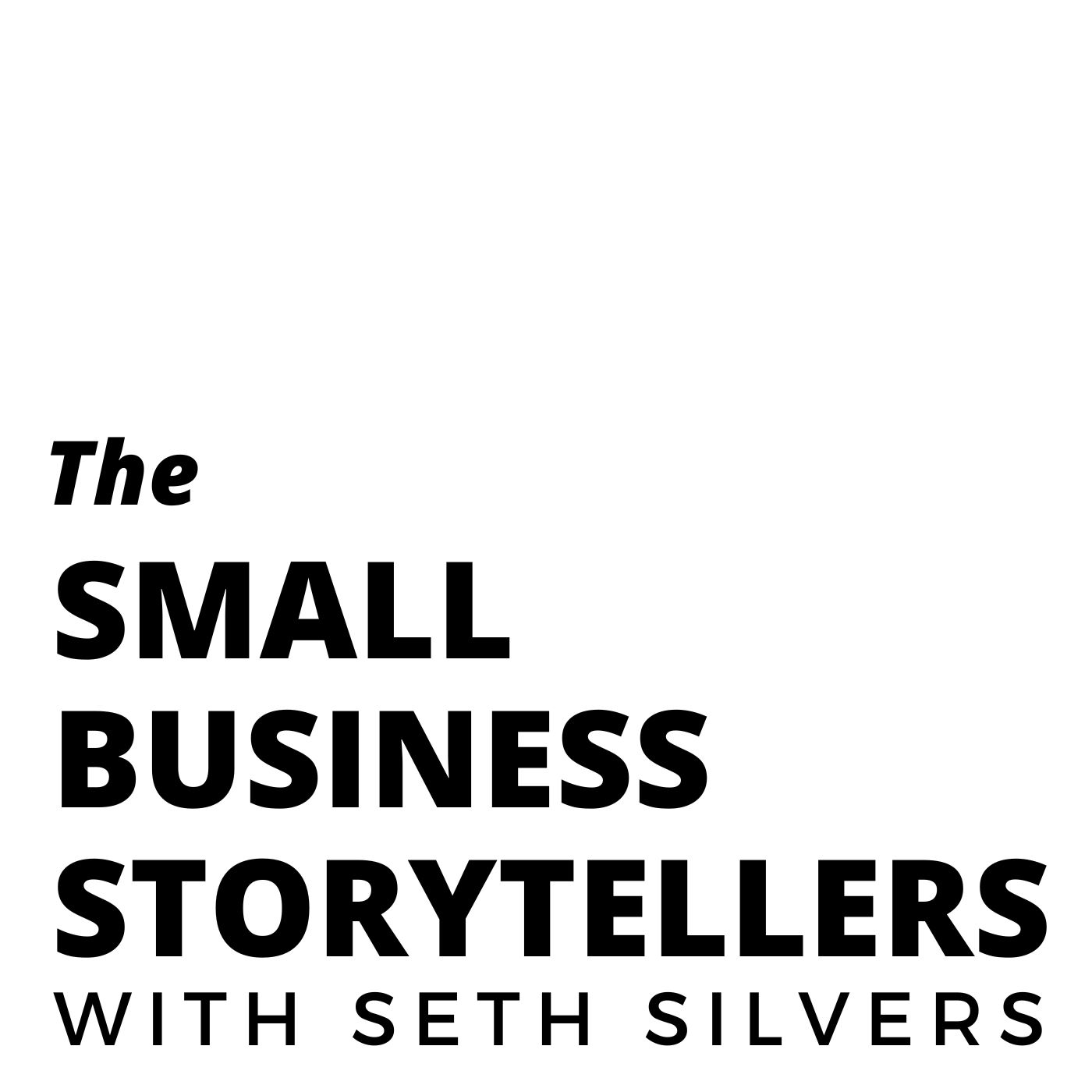
The Small Business Storytellers with Seth Silvers
Seth Silvers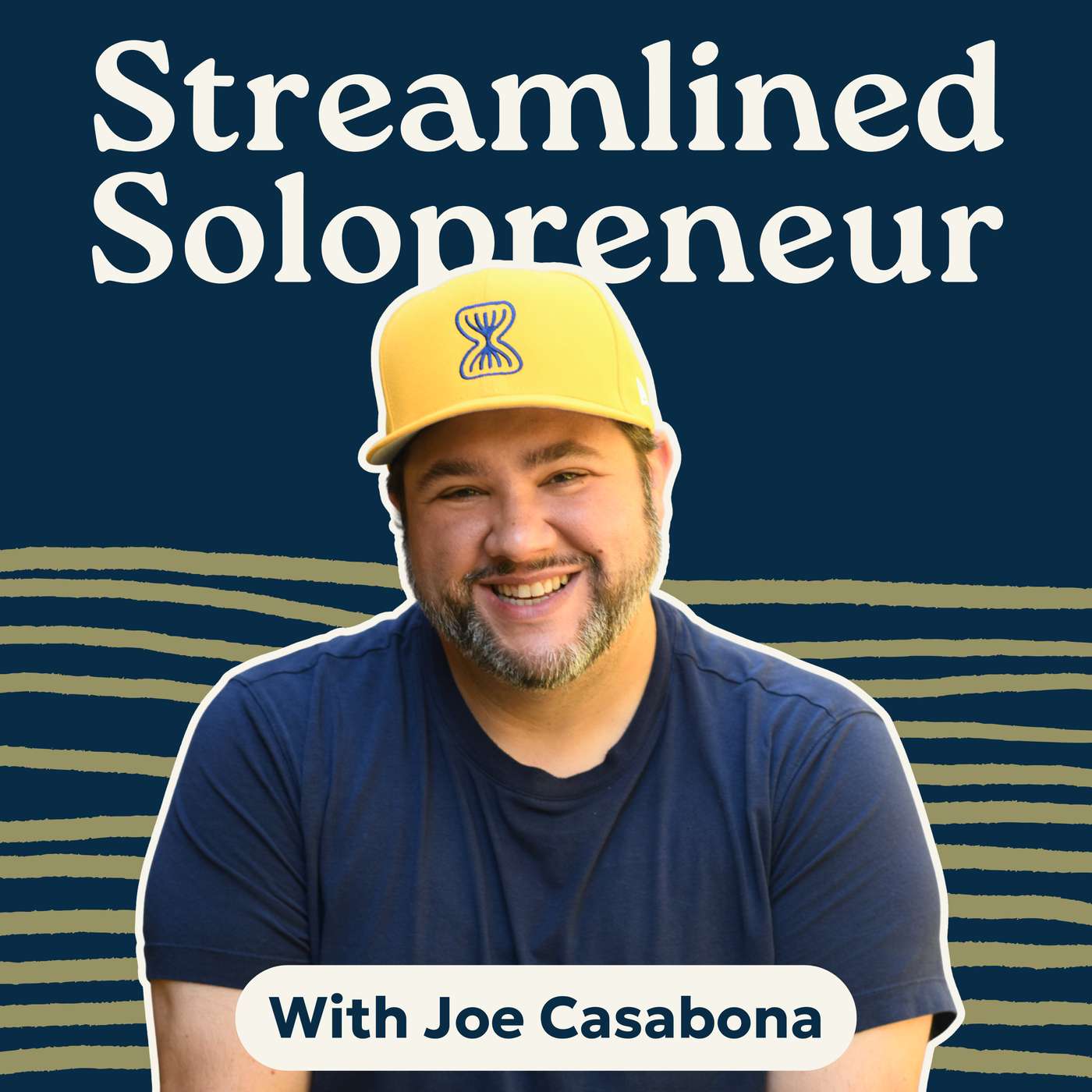
Streamlined Solopreneur: Tips to Help Small Business Owners Grow Without Burnout
Joe Casabona, Business Systems Coach
Insider Secrets to a Top 100 Podcast with Courtney Elmer | Podcasting Strategy for Business Growth
Courtney Elmer | PodLaunchHQ.comDo The Thing
Stacey Lauren
Tech Bytes - with Dan Hafner
Dan Hafner

